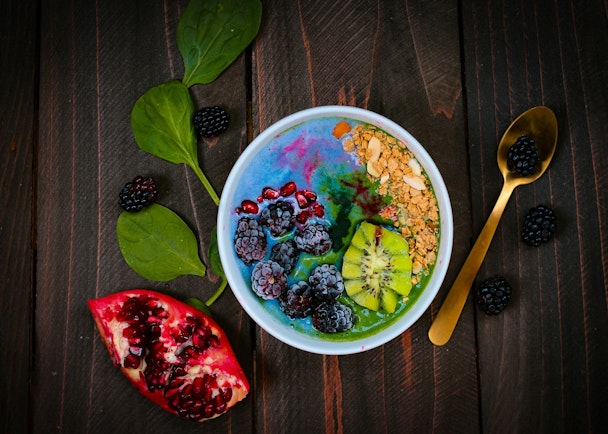You are what you eat: Why brands must lean into clean eating
For The Drum’s food & drink focus week, VaynerMedia’s Louise Lomax argues that clean eating is far more than a trend – it’s the future of consumption, and it’s time for brands to get on board.

Clean eating is here to stay - are marketers keeping up? / Kimzy Nanney via Unsplash
In an effort to do some ‘intention setting’ at the end of last year, I committed myself to do more regular exercise and eat better in 2024. Then, as if acting on a subliminal message was working through me, I felt compelled to watch You Are What You Eat, The Twin Experiment on Netflix.
At one time or another, many of us have been affected by the stomach-churning documentaries about our food chain and how much damage eating three burgers a day can do to your body. Over the years, the impact of high-budget documentaries on our eating habits as a society has become huge.
This latest fare, rather than pitting one type of diet against another (good versus bad), is more of an exploration into how our bodies respond to a plant-based diet, compared with a healthy omnivore diet – I’m talking about everything, from body fat to libido. There’s also a generous side order of important stories about animal living conditions and how they directly affect what we consume.
And for dessert: a detailed analysis of the ingredients that make their way into very well-known products on our supermarket shelves. The findings were more shocking than I predicted.
No more spoilers, though, because I think everyone should watch this without agenda. A lot of us are still incredibly naive about the unsavory things that go into our mass-produced food.
Advertisement
Pushing our buttons
You Are What You Eat is not the first instance of filmmaking raising awareness and inspiring movements, and it certainly won't be the last. Emotion can have a profound impact on societal behaviors. The recent ITV drama series Mr Bates vs The Post Office triggered such a massive outcry it resulted in a tangible shift in the handling of the matter. Groundbreaking documentaries such as Supersize Me were pivotal in helping reshape public perceptions and behaviors around fast food.
When media delves into relatable human experiences it’s a powerful vehicle to prompt consumers to reconsider their choices. This is why an honest message that drives true emotional engagement is so important in advertising and marketing; when it’s done right, it’s an unrivaled catalyst for consumers demanding change or choosing one brand over another.
Wouldn’t it be great if more brands would listen and react to their consumers, and behave more consumer-up than boardroom-down? Some brands are already doing it, of course, especially the smaller ones and the start-ups. The growing movement for clean eating signifies a real shift in consumer expectations, which will hopefully put pressure on brands to prioritize transparency, ethical practices, and cleaner product options.
Advertisement
When marketers do more than just marketing
This isn’t about calories; it’s about marketers playing their part in how much a clean and ethical supply chain really impacts our overall health and well-being as a population. Brands, product designers, and advertisers all have a huge sway over what the population eats.
Just as important as product innovation, though, is the accessibility of these products.
Some consumers can vote with their wallets for change but there is a much larger audience for whom clean eating feels a million miles away from reality. Those on low incomes need to feel they can provide healthy, clean and/or plant-based meals for their families.
Suggested newsletters for you
On top of more accessible price points for ‘clean’ or plant-based products, how about sponsored cookery courses in the community, brand ‘farmers’ markets, or food trucks in low-income areas?
This isn’t just a trend; the appetite for clean eating is only going to grow and everyone should have easy access to the right food. Brands have a remarkable chance to walk the talk of marketing with purpose, lead this section of the grocery sector – and do what’s right for our population.
Consumers have great power too, if we use it. We’ve seen just how quickly brands have come up with new ranges when people go plant-based en masse. If consumers demand it, brands will provide it.
At dinner recently, we talked about what our most radical predictions could be for the next generation. Someone said: "Will our next generation look at pictures of their families from 10-20 years ago tucking into roast chicken and steak and react with horror, or simply fascination, that we EVER did that?”
For more about food, drink, and the smartest ways to market them, check out our dedicated focus week hub.
Content by The Drum Network member:

VaynerMedia
VaynerMedia is a global creative and media agency with offices in New York, Los Angeles, London, Singapore and Mexico City.
We work differently because we’re...

